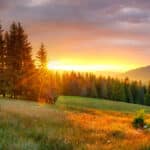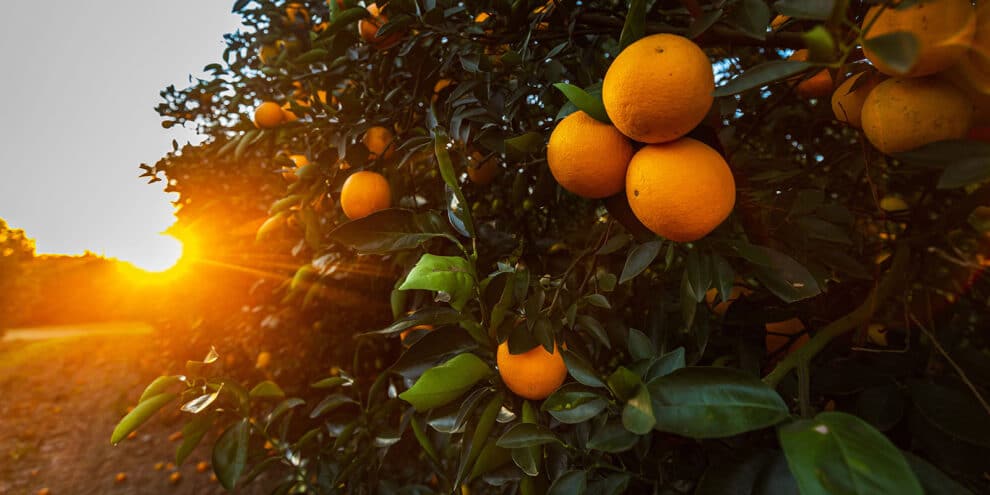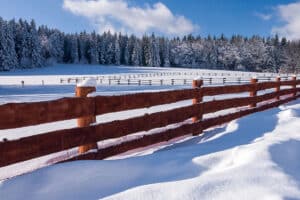Editor’s Note: This is the seventh in a question-and-answer series with land real estate professionals — land agents, mortgage brokers, auctioneers, attorneys, timberland professionals and more. There’s a lot of information about the national real estate market out there, but it’s tough to find answers to your specific land real estate questions — until now. LANDTHINK believes that a lot of the stress of buying, selling, and owning land can be reduced or eliminated with some simple information from some of the best in the land industry.
Landbuyer Question:
I’m a 28-year-old guy from Northern Virginia that’s just about to complete my Bachelor’s degree in Computer Science. However, my ultimate goal is to pursue a quiet, slower-paced lifestyle in a warmer climate. My dream is to buy land in the Panhandle area of Florida and become a farmer. Can you make a living being a farmer in that area and live comfortably? How many acres would I need to get started? What crops do farmers in that area grow that make them a lot of money?
Daniel Hautamaki, Land Broker, Farm and Forest Brokers, Licensed in FL, GA, and AL
Dear Future Florida Farmer,
Let me say up front that this is an incredible dream, you can do this, and I’m happy to help you reach your goal of becoming a Florida farmer! It always excites me to hear about talented and driven people with a passion for land ownership deciding to move to my area. Come join us, and join in the care, improvement, and enjoyment of this beautiful state.
There are a lot of ways to answer your questions; my comments below are just a starting point.
“Can you make a living being a farmer in the Florida Panhandle and live comfortably?”
Short answer: yes. Hundreds of people are doing it already. How this applies to you, however, is in what you plan to farm and the standard of living you hope to maintain. Whether generational families working hundreds of acres of cotton and peanuts or first-time growers selling vegetables at the local farmers market, most of the farmers I know value simplicity, self-sufficiency, and thrift. Farming is hard work and the profit margins are sometimes narrow; it can be a slow but steady path to wealth creation. If you’re the kind of person that finds fulfillment in simple pleasures like running a successful business, getting the most production out of your land, investing in your community, and putting down deep roots in some dirt that you can call your own, then farming may indeed be right for you.
“What crops do farmers in that area grow that make them a lot of money?”
I have a farmer friend that once said, “These days, you can’t afford to get into farming, and you can’t afford to get out of it.” His family grows and harvests cotton and peanuts on several hundred acres. It requires specialized equipment (with specialized bank loans), generations of know-how, and an ongoing operation that has been decades in the making. Someone just starting out probably won’t begin with large-scale farming of the bigger Florida commodities (cotton, peanuts, corn, soybeans). But these are just a very small selection of things that can be grown in this region.
I’ve worked with clients who are growing dozens of different things on farms of all sizes. Citrus and other fruit trees, vegetables, blueberries, muscadine grapes, mushrooms, pecans, flowers and ornamental plants, timber, beehives, goats, chickens, cows…there are many things that do well in the Panhandle. The best advice I can offer is to consider what type of farming most excites you. Are you more interested in animals or plants, and which ones? Each product also has unique markets for turning your work into income. Does working a booth at a farmer’s market sound fun? What about running a U-Pick farm and inviting people to come on-site to share the work and enjoy your hospitality? How about a direct-to-consumer approach with online ordering, shipping, and delivery?
That last one—direct-to-consumer—may be the best way to get started right now. The idea is to look for “value added” ways to improve what you are producing and then get it straight into the hands of an end-user. For example, if you turn a satsuma into jam, your profit margin should increase. Other ideas I’ve seen: turning goat milk and beef tallow into skincare products, honey into BBQ sauce, custom beef or pork butchering for individuals instead of wholesale, flower arrangements for weddings, even just shelling pecans; anything you can think of that adds value to what you’re growing. Some farmers pair this approach with agritourism as well—festivals to show off their products while customers enjoy a day on the farm with corn mazes, petting zoos, photos with sunflowers, hayrides, and more. If you think creatively, you can increase your profit margin and find even more enjoyment from making the most of your land.
As you can see, your income level depends on lots of factors. But mostly it will be determined by 1) how hard you’re willing to work, 2) how well you can run a business and 3) your skill at growing things and making the most of them. There are always market conditions outside your control that cause prices and demand to fluctuate, but your financial success will be tied to how well you can produce the most/best with the least amount of cost, anticipate the shifts in what people want, and get your product into their hands for a profit. This means becoming an expert on Florida soils, weather, growing seasons, specific subspecies of flora and fauna, pests and diseases, local markets, customer expectations, government regulations and programs, do-it-yourself building and repairs, business skills like controlling costs, product development, marketing, pricing, sales, and accounting, and much more. Daunting? Sure. But if you can get a handle on it, you’ll see your dream of running a profitable farm become a reality.
“How many acres would I need to get started?”
As many as you can comfortably afford while still having enough money to start growing things and meeting expenses. Generally, the more you land you have, the more you can produce. I’ve known people who can make money on just a few acres. But farmers who have successful careers are usually working with much more space. Exactly how much you need is determined by what you’re going to grow, the productivity of the soil you’re farming, and how skilled you are. Do you want to start a cattle operation? If so, you’ll be looking at more acreage than if you wanted to grow vegetables for the local farmer’s market. How much you can afford will also depend on where you want to be. The Panhandle is a big area and land prices vary. If your marketing approach requires direct access to restaurants or lots of consumers, you’ll want to farm close to one of the urban centers like Tallahassee or along the Gulf Coast from Panama City to Pensacola. Many towns along the I-10 corridor are seeing significant growth as well, which may open new markets as time goes on. Usually, the closer you are to town, the more land prices rise.
Take a couple of weeks and come visit. Stay in the bigger cities to learn about your market and then take long drives in the outlying areas to learn the lay of the land. Stop at farm stands, farmer’s co-ops, and hardware stores to meet the locals. You’ll learn more about what a place is like from five minutes chatting with someone that grew up there than you ever could from the internet. A local agricultural County Extension office and USDA office are also great places to call or visit to gain some area knowledge on crop production and recommended acreages for local soils.
Lastly, we are in a unique time in the life of the American Farmer. There are many older farmers without anyone to carry on their life’s work and legacy. If you build relationships in a community, you may find opportunities to do an internship with an operating farm to learn the ropes. And in some cases, we’ve seen promising young farmhands work out a transition plan with a farmer looking to retire. These arrangements are earned through trust and can be an honoring way to see farms passed down to the next generation of land stewards.
I hope this information is helpful to you. What you are considering is a big leap, but it’s one that many have taken before you. I wish you the absolute most success.
Do you have a specific land real estate question for one of our professionals? Submit your question and we might choose yours!
This content may not be used or reproduced in any manner whatsoever, in part or in whole, without written permission of LANDTHINK. Use of this content without permission is a violation of federal copyright law. The articles, posts, comments, opinions and information provided by LANDTHINK are for informational and research purposes only and DOES NOT substitute or coincide with the advice of an attorney, accountant, real estate broker or any other licensed real estate professional. LANDTHINK strongly advises visitors and readers to seek their own professional guidance and advice related to buying, investing in or selling real estate.










Add Comment